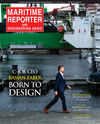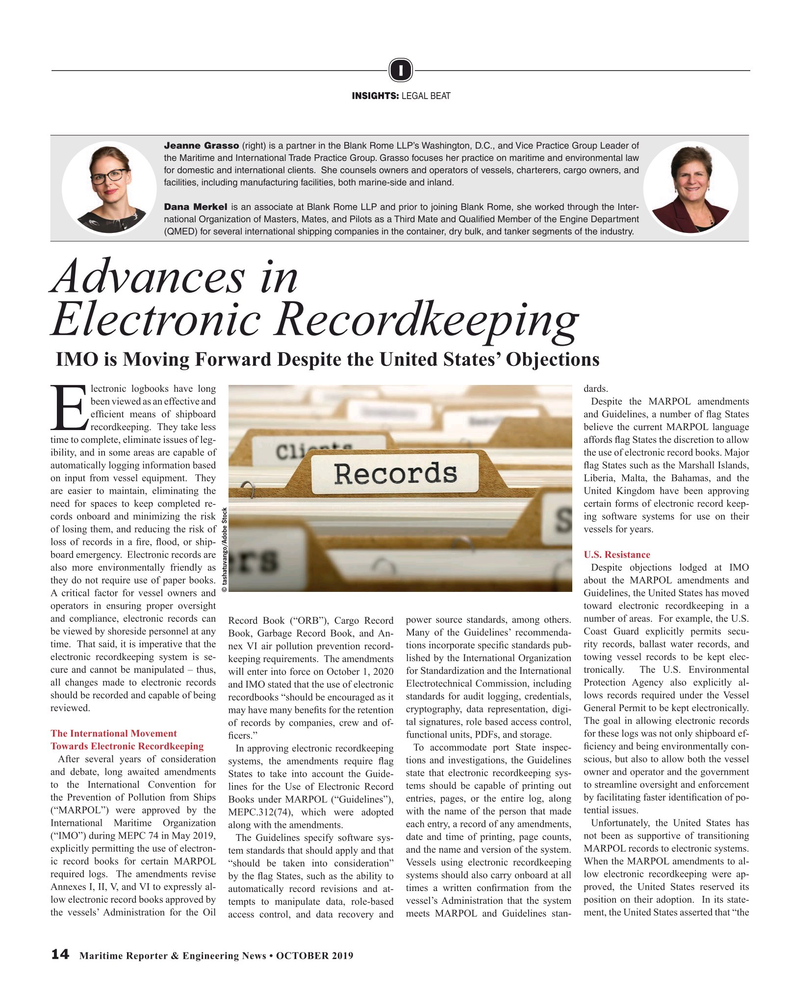
Page 14: of Maritime Reporter Magazine (October 2019)
Marine Design Annual
Read this page in Pdf, Flash or Html5 edition of October 2019 Maritime Reporter Magazine
I
INSIGHTS: LEGAL BEAT
Jeanne Grasso (right) is a partner in the Blank Rome LLP’s Washington, D.C., and Vice Practice Group Leader of the Maritime and International Trade Practice Group. Grasso focuses her practice on maritime and environmental law for domestic and international clients. She counsels owners and operators of vessels, charterers, cargo owners, and facilities, including manufacturing facilities, both marine-side and inland.
Dana Merkel is an associate at Blank Rome LLP and prior to joining Blank Rome, she worked through the Inter- national Organization of Masters, Mates, and Pilots as a Third Mate and Quali? ed Member of the Engine Department (QMED) for several international shipping companies in the container, dry bulk, and tanker segments of the industry.
Advances in
Electronic Recordkeeping IMO is Moving Forward Despite the United States’ Objections lectronic logbooks have long dards.
been viewed as an effective and Despite the MARPOL amendments ef? cient means of shipboard and Guidelines, a number of ? ag States
Erecordkeeping. They take less believe the current MARPOL language time to complete, eliminate issues of leg- affords ? ag States the discretion to allow ibility, and in some areas are capable of the use of electronic record books. Major automatically logging information based ? ag States such as the Marshall Islands, on input from vessel equipment. They Liberia, Malta, the Bahamas, and the are easier to maintain, eliminating the United Kingdom have been approving need for spaces to keep completed re- certain forms of electronic record keep- cords onboard and minimizing the risk ing software systems for use on their of losing them, and reducing the risk of vessels for years.
loss of records in a ? re, ? ood, or ship- board emergency. Electronic records are U.S. Resistance also more environmentally friendly as Despite objections lodged at IMO they do not require use of paper books. about the MARPOL amendments and © tashatuvango/Adobe Stock
A critical factor for vessel owners and Guidelines, the United States has moved operators in ensuring proper oversight toward electronic recordkeeping in a and compliance, electronic records can Record Book (“ORB”), Cargo Record power source standards, among others. number of areas. For example, the U.S. be viewed by shoreside personnel at any Book, Garbage Record Book, and An- Many of the Guidelines’ recommenda-
Coast Guard explicitly permits secu- time. That said, it is imperative that the nex VI air pollution prevention record- tions incorporate speci? c standards pub- rity records, ballast water records, and electronic recordkeeping system is se- keeping requirements. The amendments lished by the International Organization towing vessel records to be kept elec- cure and cannot be manipulated – thus, will enter into force on October 1, 2020 for Standardization and the International tronically. The U.S. Environmental all changes made to electronic records and IMO stated that the use of electronic Electrotechnical Commission, including Protection Agency also explicitly al- should be recorded and capable of being recordbooks “should be encouraged as it standards for audit logging, credentials, lows records required under the Vessel reviewed. General Permit to be kept electronically. may have many bene? ts for the retention cryptography, data representation, digi- tal signatures, role based access control, The goal in allowing electronic records of records by companies, crew and of-
The International Movement for these logs was not only shipboard ef- ? cers.” functional units, PDFs, and storage.
Towards Electronic Recordkeeping ? ciency and being environmentally con-
In approving electronic recordkeeping To accommodate port State inspec-
After several years of consideration systems, the amendments require ? ag tions and investigations, the Guidelines scious, but also to allow both the vessel and debate, long awaited amendments States to take into account the Guide- state that electronic recordkeeping sys- owner and operator and the government to the International Convention for lines for the Use of Electronic Record tems should be capable of printing out to streamline oversight and enforcement the Prevention of Pollution from Ships Books under MARPOL (“Guidelines”), entries, pages, or the entire log, along by facilitating faster identi? cation of po- (“MARPOL”) were approved by the MEPC.312(74), which were adopted with the name of the person that made tential issues.
International Maritime Organization along with the amendments. each entry, a record of any amendments,
Unfortunately, the United States has (“IMO”) during MEPC 74 in May 2019, date and time of printing, page counts, not been as supportive of transitioning
The Guidelines specify software sys- explicitly permitting the use of electron- tem standards that should apply and that and the name and version of the system. MARPOL records to electronic systems. ic record books for certain MARPOL “should be taken into consideration” Vessels using electronic recordkeeping When the MARPOL amendments to al- required logs. The amendments revise by the ? ag States, such as the ability to systems should also carry onboard at all low electronic recordkeeping were ap-
Annexes I, II, V, and VI to expressly al- times a written con? rmation from the proved, the United States reserved its automatically record revisions and at- low electronic record books approved by tempts to manipulate data, role-based vessel’s Administration that the system position on their adoption. In its state- the vessels’ Administration for the Oil access control, and data recovery and meets MARPOL and Guidelines stan- ment, the United States asserted that “the 14 Maritime Reporter & Engineering News • OCTOBER 2019
MR #10 (10-17).indd 14 10/4/2019 9:22:19 AM

 13
13

 15
15
